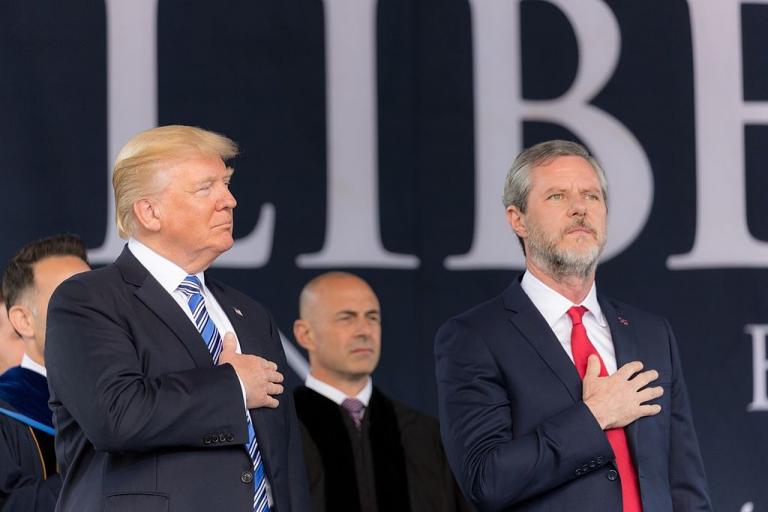Michael Gerson, an evangelical Christian who was formerly George W. Bush’s speechwriter, has written a searing article published in The Atlantic. He asks the question, why is it that so many white evangelical Christians–4 out of 5, far more than voted for Ronald Reagan–support Donald Trump, even though he would seem to be the antithesis of everything Christians hold dear.
His article is worth reading, but it has provoked some equally interesting responses. I’ll link to those and add my own thoughts about issues that Gerson, in my opinion, is missing. Then I’d like to hear from you.
First, the article that is stirring up the controversy. From Michael Gerson, Trump and the Evangelical Temptation, The Atlantic:
Trump’s background and beliefs could hardly be more incompatible with traditional Christian models of life and leadership. Trump’s past political stances (he once supported the right to partial-birth abortion), his character (he has bragged about sexually assaulting women), and even his language (he introduced the words pussy and shithole into presidential discourse) would more naturally lead religious conservatives toward exorcism than alliance. This is a man who has cruelly publicized his infidelities, made disturbing sexual comments about his elder daughter, and boasted about the size of his penis on the debate stage. His lawyer reportedly arranged a $130,000 payment to a porn star to dissuade her from disclosing an alleged affair. Yet religious conservatives who once blanched at PG-13 public standards now yawn at such NC-17 maneuvers. We are a long way from The Book of Virtues.
Trump supporters tend to dismiss moral scruples about his behavior as squeamishness over the president’s “style.” But the problem is the distinctly non-Christian substance of his values. Trump’s unapologetic materialism—his equation of financial and social success with human achievement and worth—is a negation of Christian teaching. His tribalism and hatred for “the other” stand in direct opposition to Jesus’s radical ethic of neighbor love. Trump’s strength-worship and contempt for “losers” smack more of Nietzsche than of Christ. Blessed are the proud. Blessed are the ruthless. Blessed are the shameless. Blessed are those who hunger and thirst after fame.
Gerson then traces the history of evangelical involvement in politics, which has often been positive, but has degenerated into little more than reactionary, fearful cultural resentment. One problem, he says, is that unlike Catholics, evangelicals don’t have a theological basis for social involvement that can guide their political action. (Catholics have “subsidiarity,” the authority of mediating social institutions, and the “consistent pro-life ethic” that relates opposition to abortion to opposition to war and capital punishment and support of immigrants and the poor.)
Gerson is especially hard-hitting with his assertion that evangelicals’ uncritical support for Trump has led to the discrediting of the Christian message. “Evangelical,” he says, quoting Tim Keller, has “become a synonymous for ‘hypocrite.'” The spectacle of prominent pastors and Christian leaders continually covering for Trump’s transgressions–including an adulterous affair with a porn star–have utterly destroyed their credibility and turned them into jokes.
The moral convictions of many evangelical leaders have become a function of their partisan identification. This is not mere gullibility; it is utter corruption. Blinded by political tribalism and hatred for their political opponents, these leaders can’t see how they are undermining the causes to which they once dedicated their lives. Little remains of a distinctly Christian public witness.
Now read the critiques of Gerson’s article.
My fellow Patheos blogger Scott McKnight has written What Gerson Got Seriously Wrong. He says that evangelical Christians do have a theology for social and political involvement. He cites specifically the work of the Dutch theologian and statesman Abraham Kuyper, which was popularized in the United States by Francis Schaeffer. He says that the Kuyperian approach encourages a transformative Christian influence in all spheres of life.
I would add that the influence of Kuyper–who founded a Christian political party in the Netherlands that for a time ruled the country–appears to be waning among the Christians who are supporting Trump. A Kuyperian perspective encourages Christians to exercise political power. Taken to an extreme, it can become “theonomy,” the theocratic project of trying to rule the secular world by God’s law. But this is the opposite of what we are seeing now.
Christians who support Trump so strongly have evidently given up on having a Christian ruler–which Trump is obviously not–and are no longer trying to function as a “moral majority” trying to control society in accord with Biblical principles. You would think that those worried about Christians trying to impose a theocracy would be heartened that they are rallying around Trump instead. They should give Christians credit for adopting a more secular and less moralistic approach in their political activism.
Kuyper’s “sphere sovereignty” is much like Roman Catholic “subsidiarity.” The Catholic social ethic allows Christians to seem some time on the conservative side (opposing abortion) and some time on the liberal side (opposing capital punishment), which keeps them from being pigeonholed politically, which is perhaps helpful for their witness to non-Christians. (Though equating the murder of children in the womb with the execution of murderers is a monumental case of false equivalence.) Kuyperians are more likely to be consistent conservatives, as evangelical political activists have tended to be.
On the other hand, Trump is far from a consistent conservative. Christian Trump supporters are also conservative on some issues (abortion, immigration) while liberal on others (tariffs, sexual permissiveness). You would think they deserve credit for this broader political perspective.
One of the pioneering Never Trumpers, David French, has written a column for National Review defending Christian Trump supporters from Gerson’s criticisms. He says that Christians really have been facing serious attacks on their religious liberty and their deepest values. They are right to defend themselves and their beliefs–especially their pro-life convictions–politically.
He says that if evangelical Trump voters are morally compromised, the same is true for voters who chose Hillary Clinton, whose own moral failings and pro-abortion policies would have been disastrous. French warns his fellow evangelicals, though, of swallowing all of Trumpism and from surrendering their moral convictions out of political loyalty. “Evangelicals had good reasons to vote for Trump,” says French; “they don’t have good reasons to join his tribe.”
Another factor in the Christian support for Trump, I would argue, is the populist phenomenon. Rank and file Christian laypeople, like other Americans, have become cynical about “the establishment” and wanted to elect someone whom that establishment did not control. Evangelicals have been frustrated that the Republicans they voted for, including fellow evangelical George W. Bush, did very little to promote their interests, including stemming the tide of abortion on demand. Trump, though, has come through for them in a way that previous Republicans have not.
The most important factor in Christians supporting Trump is the pro-life issue. For all of Trump’s vices, he has appointed pro-life judges, quit UN family planning programs, allowed pro-life exemptions to Obamacare, and supported defunding of Planned Parenthood (which Republicans in Congress continue to protect).
In the general giving-up on politics, conservative Christians continue to hold on to that one issue. Abortion is so evil, so monstrous, that they continue to fight it by any means necessary. For better or worse, this means an alliance with Trump.
What do you think?
If you are a conservative Christian supporting President Trump, why are you doing that?
How would you answer Gerson’s criticisms? Are his critics right? Are there other factors that they aren’t considering?
Photo, Donald Trump delivers remarks at Liberty University [with President Jerry Falwell, Jr.], by Shealah Craighead [Public domain], via Wikimedia Commons













